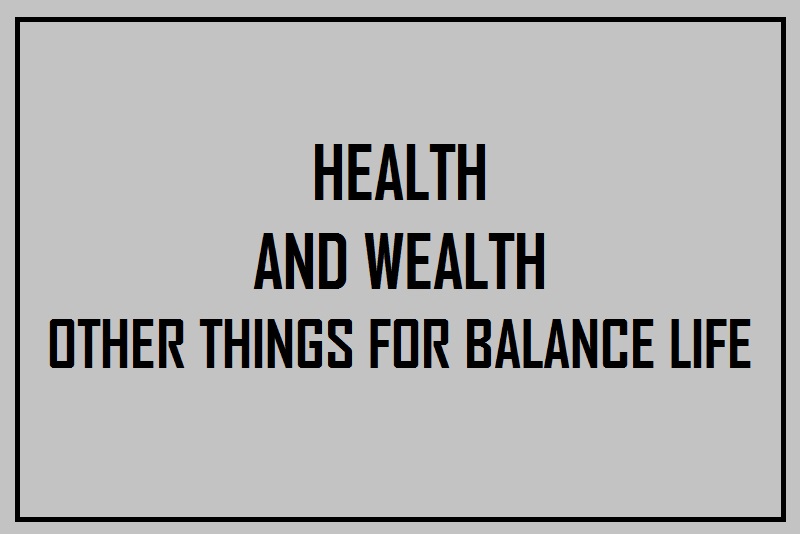HEALTH AND WEALTH - OTHER THINGS FOR BALANCE LIFE........
Growing up, we have heard the adage ‘Health is Wealth‘, and the reverse “Wealth is also Health“. A healthy life is the highest blessing which must not be taken for granted. And these testing times serves as an eye-opener for everyone.
It may seem difficult to connect the dots between physical health and financial wealth, but the correlation is actually very simple. To start, there are certain aspects of each field that are related, most importantly, the self. You are the one who can change your health and wealth in a positive way, and you are also the one who will be affected by that change. In this case, being selfish is not only acceptable, but necessary. Commitment and accountability are two other big parts of health and wealth. It is essential to commit to your personal health and wealth to succeed in each area. These things are in your control only, so you must take accountability for your commitment. Health and wealth are both positive things (even though they might not always seem like it). Physical health is part of a positive lifestyle; if you feel good, you’ll do good. Having stable finances will also contribute to a positive life, reduce worry, and allow you to make time to do things you love with the people you love.
Financial Moxie founder Kristen Hafner talks about balance and control in an interview with Purse Strings. She mentions that people often shy away from health and wealth because they’re “scary.” But these are parts of our lives that are completely in our control, so why do we want to avoid them so much? Trying to create a life balance can be intimidating and overwhelming; a lot of things are out of our control, like family and work. Food, fitness, and finance, however, are three aspects of life that can be controlled. By compartmentalizing these three things away from other aspects of your life, balance seems more and more achievable.
The obstacles we face when encountering health and wealth can sometimes feel monumental. But, if you take a step back, they often overlap between the two categories. Fear, avoidance, impulse, and lack of confidence or knowledge are barriers standing in the way of a balance in health and wealth. Recognizing these obstacles is the first step in overcoming them; committing to yourself is the next step.
To gain confidence and knowledge about health and wealth, seeking out advice from professionals is key. But there are some things you can do on your own as well. Taking accountability for your impulses and working to overcome them is a great first step. Working towards positive change is the goal for finding balance between health and wealth. Considering not only physical health and financial stability, but your personal happiness and goals, will lead to life balance and success
While it can be fun to live in the moment, the secret to building wealth without damaging your health lies in taking a balanced approach. Here are six ways to find a work-life balance that allows you to enjoy today while saving for tomorrow.
1) Don't wait
If you don’t think that you will be able to meet your income needs in retirement, don't waste time beating yourself up about it. Meet with your financial team now to take immediate action. You may want to consider whether you are accumulating wealth in the most tax-efficient accounts and also revisit your regular expenditures. Having a clear plan in place can help you increase opportunities available to you when you retire.
2) Rethink retirement income
When interest rates are high, many retired investors look to bond portfolios for income. But with sustained low interest rates, those accumulating wealth for retirement as well as those already in retirement may need to consider other avenues to generate their income.
“Sometimes, fear of risk makes people too conservative with retirement savings. They don't want to lose what they've worked so hard for,” McMillion says. “But you do want to get a good return on your money.&rdquo Because people are living longer in retirement, you may want to keep exposure to equities and other growth investments even as you get closer to retirement. A portfolio that relies solely on fixed income may not be able to keep up with inflation. “Talk to your investment specialist to determine which strategies align with your specific needs,” offers McMillion.
3) Involve your family
Take advantage of opportunities to talk with your family about finances. When your children are young, it can help to explain why it's so important for you to save for the future and that sometimes short-term sacrifices are necessary to make that happen. Understanding the family's financial realities may help lower everyone's stress levels when you occasionally have to make the choice to skip a Little League game or gymnastics meet in order to put in some extra hours at work. By having regular conversations about budgeting and investing, your children will be well informed as they mature and more prepared for their own financial futures.
4) Take care of your health
Neglecting self-care not only interferes with your quality of life but can also make your post-retirement health care costs skyrocket. Protect your health and your nest egg by eating a healthy diet, exercising most days of the week, maintaining a healthy weight, getting regular health checkups, and staying up to date on vaccinations. These things do take time and effort, but they can have big payoffs later in life.
5) Make your money work as hard as you do
Business owners often have their company’s balance sheet top of mind as they build their business. But once the business is passed along, their personal balance sheet will need to be structured to sustain them. As always, diversification and asset placement are key strategies to help plan for growth and income in a portfolio. Your investment professional can help you evaluate your current allocation against your anticipated needs and recommend adjustments to help keep you on track.
6) Think beyond Money
Investing cash during your prime earning years is important, of course. But it's also essential to plan in a more holistic way as well. “Make investments in the future — not just monetary ones, but also in relationships, health, career, and education,” Lachman says. “They all can pay big dividends in the long run.”



